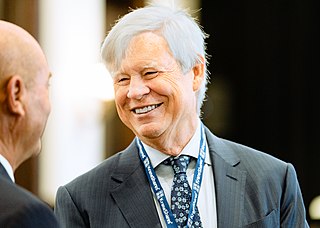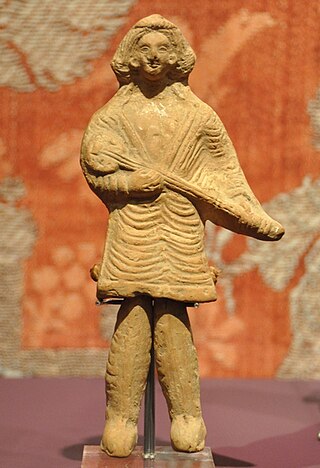Related Research Articles

Although definitions of music vary wildly throughout the world, every known culture partakes in it, and it is thus considered a cultural universal. The origins of music remain highly contentious; commentators often relate it to the origin of language, with much disagreement surrounding whether music arose before, after or simultaneously with language. Many theories have been proposed by scholars from a wide range of disciplines, though none has achieved broad approval. Most cultures have their own mythical origins concerning the invention of music, generally rooted in their respective mythological, religious or philosophical beliefs.

The Cavendish Laboratory is the Department of Physics at the University of Cambridge, and is part of the School of Physical Sciences. The laboratory was opened in 1874 on the New Museums Site as a laboratory for experimental physics and is named after the British chemist and physicist Henry Cavendish. The laboratory has had a huge influence on research in the disciplines of physics and biology.

Sir William Lawrence Bragg, was an Australian-born British physicist and X-ray crystallographer, discoverer (1912) of Bragg's law of X-ray diffraction, which is basic for the determination of crystal structure. He was joint recipient of the Nobel Prize in Physics in 1915, "For their services in the analysis of crystal structure by means of X-rays"; an important step in the development of X-ray crystallography.

Isadore Manuel Singer was an American mathematician. He was an Emeritus Institute Professor in the Department of Mathematics at the Massachusetts Institute of Technology and a Professor Emeritus of Mathematics at the University of California, Berkeley.

Robert Fry Engle III is an American economist and statistician. He won the 2003 Nobel Memorial Prize in Economic Sciences, sharing the award with Clive Granger, "for methods of analyzing economic time series with time-varying volatility (ARCH)".

Leon Mestel was an Australian astronomer and astrophysicist and Emeritus Professor at the University of Sussex. His research interests were in the areas of star formation and structure, especially stellar magnetism and astrophysical magnetohydrodynamics. He was awarded both the Eddington Medal (1993) and the Gold Medal of the Royal Astronomical Society. Following his retirement, he wrote several obituaries and biographical articles on physicists and astrophysicists.
Abū Isḥāq Ibrāhīm al-Mawṣilī was an Arab musician of Persian origin who was among the greatest composers of the early Abbasid period. After Arab and Persian musical training in Ray, he was called to the Abbasid capital of Baghdad where he served under three successive Abbasid caliphs: Al-Mahdi, Al-Hadi and Harun al-Rashid. He became particularly close with the latter and emerged as the leading musician of his time. He championed the conservative school of Arab music against progressives such as Ibn Jami. His son and student Ishaq al-Mawsili would succeed him as the leader of the conservative tradition and his other pupils included the musicians Mukhariq, Zalzal and Ziryab. He appears in numerous stories of One Thousand and One Nights.

Sasanian music encompasses the music of the Sasanian Empire, which existed from 224 to 651 CE. Many Sasanian Shahanshahs were enthusiastic supporters of music, including the founder of the empire Ardashir I and Bahram V. In particular, Khosrow II was an outstanding patron, his reign being regarded as a golden age of Persian music.
Takeshi Amemiya is an economist specializing in econometrics and the economy of ancient Greece.
Jerome H. Barkow is a Canadian anthropologist who works in the field of evolutionary psychology. He is a professor emeritus at Dalhousie University.

Hormoz Farhat was a Persian-American composer and ethnomusicologist who spent much of his career in Dublin, Ireland. An emeritus professor of music, he was a fellow of Trinity College, Dublin. Described by the Irish Times as a "a gifted and distinctive composer of contemporary classical music," his compositions include orchestral, concertante, piano and choral music, as well string quartets and chamber works. He also wrote numerous film scores, including that of Dariush Mehrjui's 1969 film The Cow. However, his musicological research dominates his legacy; his writings on the music of Iran—a country which he insisted be called 'Persia'—were pivotal in ethnomusicology, particularly his acclaimed 1990 study The Dastgah Concept in Persian Music.
Michael Friedman is an American philosopher who serves as Professor of Philosophy and the Frederick P. Rehmus Family Professor of Humanities at Stanford University. Friedman is best known for his work in the philosophy of science, especially on scientific explanation and the philosophy of physics, and for his historical work on Immanuel Kant. Friedman has also done historical work on figures in continental philosophy such as Martin Heidegger and Ernst Cassirer. Friedman also serves as the co-director of the Program in History and Philosophy of Science and Technology at Stanford University.
Nagisa or Nakisa was a noted harpist and composer of Sasanian music in the royal court Khosrow II.

Robert Rowthorn FAcSS FLSW is Emeritus Professor of Economics at the University of Cambridge and has been elected as a Life Fellow of King’s College. He is also a senior research fellow of the Centre for Population Research at the Department of Social Policy and Intervention, University of Oxford.
Arnold Whittall is a British musicologist and writer. He is Professor Emeritus at King's College London. Between 1975 and 1996 he was Professor at King's. Previously he lectured at Cambridge, Nottingham (1964–1969) and Cardiff (1969–1975), where one of his students was Australian composer Norma Tyer.

The Parthian Empire, a major state of ancient Iran, lasted from 247 BCE to 224 CE, in which music played a prominent role. Compared to their Western rival, the Roman Empire, much less is known about the Parthians, but information on music can be gathered from a few Parthian texts, accounts from Greek and Roman writers, some archeological evidence, and a variety of visual sources. The last of these are usually from either the archeological sites and former settlements of Hatra or Nisa, and include terracotta plaques, reliefs and illustrations on drinking horns known as rhytons. Music played a role in many aspects of Parthian life, being used in festivals, weddings, education, warfare and other social gatherings. Surviving artistic records indicate that it involved both men and women, who could be instrumentalists or singers.

Arched harps is a category in the Hornbostel-Sachs classification system for musical instruments, a type of harp. The instrument may also be called bow harp. With arched harps, the neck forms a continuous arc with the body and has an open gap between the two ends of the arc.
References
- ↑ "Professor Emeritus Bo Lawergren". Department of Physics and Astronomy, Hunter College. Archived from the original on 2011-06-07. Retrieved 26 January 2010.
- ↑ "Bo Lawergren". Nordic Harp Meeting. Retrieved 29 September 2021.
- ↑ "Bo Lawergren | Hunter College - Academia.edu".